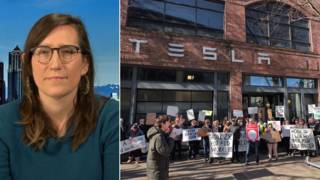
Amid an intensifying crackdown on asylum seekers at the U.S.-Mexico border, we speak to the author of the new book Unbuild Walls: Why Immigrant Justice Needs Abolition about U.S. immigration policy under the Biden administration. Author Silky Shah is the executive director of Detention Watch Network and a longtime immigration rights advocate whose new book aims to “debunk the idea that immigration is a public safety issue,” in the face of narratives, from both the Republican and Democrat political establishments, of criminality and deterrence. Despite Biden’s campaign promises to reform the immigration system, his administration has “ceded more and more ground to the Republicans and moved the whole conversation to the right,” Shah says. “Legalization isn’t even on the table.” Shah discusses how the immigrant rights’ movement uses the language of abolition to build connections with other social movements fighting oppression, from mass incarceration to police brutality. “These systems aren’t separate. … We have to call for abolition of the whole system and understand those things together.”
Transcript
AMY GOODMAN: This is Democracy Now!, democracynow.org, The War and Peace Report. I’m Amy Goodman in New York, with Juan González in Chicago.
We end today’s show looking at the intensifying crackdown on asylum seekers on the U.S.-Mexico border, as many polls show immigration is number one or number two issue for voters, above inflation and the economy in many cases, ahead of a likely rematch between President Biden and Donald Trump in November. The Biden administration is preparing new measures that could expedite the deportation of some asylum seekers deemed unlikely to qualify for protection in the early stages of the process. Immigrant rights advocates warn the new rules will further erode due process rights for migrants and disproportionately impact Black asylum seekers, who already face bias and racism from U.S. officials conducting credible fear interviews. President Biden has faced mounting criticism for supporting similar anti-immigrant policies as President Trump before him, leading to mass deportations and the separation of immigrant families.
Meanwhile, despite reports of physical and psychological violence in ICE detention and demands to shut the facilities down, President Biden in March signed a federal spending bill that dramatically increased funding for ICE and Customs and Border Protection. Rights groups also link deteriorating conditions at ICE jails to a mental health crisis among jailed immigrants. Earlier this year, a 61-year-old man from Trinidad and Tobago was found unresponsive after he was held in solitary confinement for at least 811 consecutive days at the Northwest Detention Center in Tacoma, Washington, run by the private prison company GEO Group — believed Charles Leo Daniel died of suicide. An immigrant from El Salvador named Christian Dueñas described to immigrant rights activist Maru Mora Villalpando how he witnessed authorities retrieve Daniel’s body.
CHRISTIAN DUEÑAS: [translated] When the alarm went off at around 10:45 a.m., I was in the library, and I was told that someone in solitary confinement was found unresponsive. I was brought back to my cell at around 11:30 a.m., and I saw a lot of people running around everywhere. The police arrived, and the fire department. I saw that a man, who was Black, appeared as if he had hung himself.
MARU MORA VILLALPANDO: [translated] Did you see him?
CHRISTIAN DUEÑAS: [translated] I saw him as he was being taken out.
AMY GOODMAN: For more, we’re joined by Silky Shah, executive director of Detention Watch Network and the author of a new book, just out. It’s called Unbuild Walls: Why Immigrant Justice Needs Abolition.
Silky, welcome back to Democracy Now! I want to take on all the new issues, the directives that President Biden is issuing and what’s happening in the ICE jails and the amount of money they’re getting. But I want to start with your thesis in Unbuild Walls: Why Immigrant Justice Needs Abolition. Why? And what does abolition mean? And how are you linking it to — that’s what’s really new in this book, how you’re linking it to the whole immigration-industrial complex.
SILKY SHAH: Yeah. Thanks so much. It’s so wonderful to be here.
I think, in so many ways, what this book is trying to do is debunk the idea that immigration is a public safety issue. And, in fact, so much of the conversation becomes about a moral panic around immigration and around, you know, what’s people coming to the border, when, in actuality, what’s happening is that there’s mass social inequality in the U.S., and immigrants become a scapegoat. And so, the conversation becomes about public safety and criminalization and border militarization and ways to deter, deter, deter, when, actually, immigration is about family relationships, it’s about labor, it’s, of course, about seeking refuge. And what I’m trying to do is say, “Let’s stop that frame, so that we can actually get to the core of the issue.”
AMY GOODMAN: And what does abolition mean?
SILKY SHAH: Abolition, for me, I think it’s — you know, I think, in 2020, so many people sort of started to understand it as a goal. And what I’m trying to say with this book is, actually, we need to embrace abolition, partly because we need a lens. And, you know, for so many years I worked on this issue. I came to Detention Watch Network in 2009, when Obama had just taken office. And what we saw is, through all these reforms, actually, detention and deportation went up. And we had some of the highest levels. Obama, of course, was coined “deporter-in-chief.” And it was those reforms that actually made the system more efficient and effective at targeting people and brought the numbers up. It actually led to even more use of the private prison industry to try to improve conditions. And so, reformist tactics led to the system getting worse. And I think abolition helps us not just vision where we want to go, but really actually helps us understand and gives us a lens by which we can call for changes to the system.
JUAN GONZÁLEZ: I wanted to ask you — you mentioned the Obama years. Between 2010 and 2017, roughly the Obama period in office, the U.S. deported 1.3 million noncitizens who were previously convicted of what they called aggravated felonies. But they weren’t really aggravated felonies; a lot of them were minor offenses. But these 1.3 million people were sent back to their homelands. And of those deported, 93% came from just four countries — Mexico, Guatemala, Honduras and El Salvador — even though people from those countries represent only about a third of all U.S. foreign residents. Was this an ethnically or racially targeted deportation process that occurred here?
SILKY SHAH: Yeah, absolutely. I mean, since the beginning of the modern immigrant detention system, there’s no question that racism has played a huge role in the formation of the system. We’ve seen, you know, in 1980, when the system started to take shape, it was actually targeting of Black migrants, Haitians in particular, calling them economic migrants not deserving of refuge. You know, detention started expanding in that context. And when it was called out for actually being racist in the targeting of Haitians, the U.S. government decided to apply the policy to broad categories of people. And at that time, it was really those coming from Central America that were fleeing U.S.-backed wars in the region. And so, similarly, as we’ve seen over and over again, the targeting of immigrants, it becomes a sort of “good immigrant versus bad immigrant” frame, where there is this sort of supposed proxy of, like, criminalization, when in actuality it’s about really removal of people who are believed to be unproductive or disposable for whatever reason, and often race is an unequivocal factor.
JUAN GONZÁLEZ: And you’ve been — you’re critical, to some extent, of how the immigration movement has responded to this attacking and veering of Democratic and Republican administrations in terms of immigration policy. Could you talk about that a little bit?
SILKY SHAH: Yeah, absolutely. I mean, the reality is, is that Democrats have built the system as much as Republicans have, and, in so many ways, have pushed this sort of “good immigrant versus bad immigrant” frame, really focusing on the public safety question and then saying, “Well, these individuals who are not caught up in the criminal legal system, they’re the good immigrant, but people who are are the, quote-unquote, 'bad' immigrant.”
And we’ve seen this with the immigrant rights movement repeatedly, as well, where there is this sort of trade-off with comprehensive immigration reform, where we’re going to do everything we can for those people who are, quote-unquote, “relatively innocent” and productive and exceptional in whatever way, but actually dispose of all those individuals who are targeted by the criminal legal system. And that has, unfortunately, only just ceded more and more ground to the Republicans and moved the whole conversation to the right. So, now we see, for years and years the trade-off was mass legalization for more border militarization and criminalization, and what we’ve seen over the last six months or so is, actually, legalization isn’t even on the table, and both the Democrats and Republicans are just saying, “No, we just want more border militarization,” and now these changes to asylum and border policy.
AMY GOODMAN: You write in your Unbuild Walls, “I often look back at the summer of 2018 as a missed opportunity for the immigrant justice movement to advance a vision for immigration that didn’t include detention and deportation.” In 2018, the Pulitzer Prize-winning news outlet ProPublica released audio from inside a U.S. Customs and Border Protection detention facility in which migrant children estimated between the ages of 4 and 10 are heard crying “Mamá” and “Papi” after being separated from their parents. A warning: The audio, to say the least, is disturbing.
CHILD: [crying] Papi! Papi! Papi! Papi!
BORDER PATROL AGENT: [translated] Well, we have an orchestra here, right? What we’re missing is a conductor.
AMY GOODMAN: In another part of the audio, the Border Patrol agent is heard joking in Spanish, “Well, we have an orchestra here. What’s missing is a conductor.” So, talk about what you think could have happened. Of course, this was during President Trump’s time. It was so highlighted to show the Trump administration’s inhumanity separating children. But talk about what has happened since, and what you feel needs to happen, what gives you hope.
SILKY SHAH: Yeah, absolutely. I mean, I think what was so important to understand about 2018 and what happened was that, actually, it was the Trump administration using the carceral apparatus at the border. So, as we understand it, really, and many people understand post-9/11 was the time for sort of a boom to immigrant enforcement and the deportation machine. But, really, the way that the domestic war on terror worked was through the criminal legal system, and so we had more and more prosecutions at the border. And that system was being built up by Bush and then Obama, and then it was handed over to Trump. And that was actually the system that was at the border through the Department of Justice, through, you know, U.S. attorneys, and beyond just ICE, actually, where we saw families being separated, immigrant parents being prosecuted and being put in U.S. Marshals jails, and their kids being shipped off to detention camps and shelters.
And so, part of the reason I said that is that I really do think that was a moment where we had to understand that this was beyond — these systems aren’t separate. Actually, you know, a lot of the targeting of immigrants happens through the criminal legal system. And we have to really call for abolition of the whole system and understand those things together, as opposed to this constant sort of framework of innocence, because that sort of reinforces the “good immigrant versus bad immigrant” frame as opposed to saying, “No, actually, these systems of control are meant to just target people who are perceived as disposable.”
But what gives me hope is actually those years both during the Obama administration and also during Trump and what we saw especially in 2020, is that many more people started embracing detention abolition, started understanding the criminal legal system, both because of what Obama was doing but also because of the growing Black Lives Matter movement and seeing sort of those connections with racial justice, and really sort of started breaking up that relationship between ICE and police and moving toward sanctuary policy. And we really started to bring those formal deportations that Juan was talking about down since then. And we have to, like, really understand that, actually, it’s not politically popular to target community members in the way that it was in those years, and that’s because of the movement.
AMY GOODMAN: And we’re going to do a post-show and, in that post-show, talk to you about what are the specific strategies that you think people have used, the whole theory of abolition and more. Silky Shah, executive director of Detention Watch Network, author of the new book, just out, titled Unbuild Walls: Why Immigrant Justice Needs Abolition. She’s speaking tonight at The People’s Forum here in New York City, then headed to Texas on her national book tour.
That does it for our show. A very happy birthday to Erin Dooley! Democracy Now! is produced with Mike Burke, Renée Feltz, Deena Guzder, Sharif Abdel Kouddous, Messiah Rhodes, Nermeen Shaikh, María Taracena, Tami Woronoff, Charina Nadura, Sam Alcoff, Tey-Marie Astudillo, Robby Karran, Hany Massoud. I’m Amy Goodman, with Juan González.











Media Options